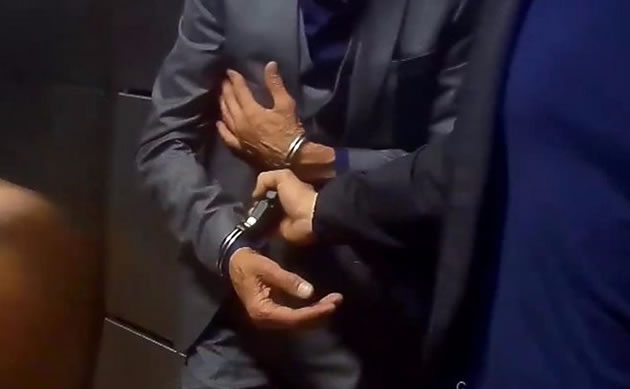TfL 'Lacks Resources' To Tackle Pick-pockets on Public Transport
Thefts rising as police focus more on violent crimes

Pick-pocket being arrested on tube. Picture: BBC
Transport for London (TfL) does not have the police resources to focus on pick-pocketing on the network, transport bosses said this Wednesday (27 November).
Crime is rising on public transport in London – mainly driven by a spike in thefts from passengers. But Siwan Hayward, head of policing for TfL, said police were focusing on preventing the most harmful violent crimes.
She said: “We have given a really clear steer to our policing partners that we want them to focus on the highest harm offences. This means we are actively seeking for them to work with us to prevent knife crime, to prevent violence, to support our staff and to tackle hate crime and sexual offences.”
Ms Hayward said police were also working to help vulnerable customers, including young people or those with mental health issues – and “often feel like an extended arm of social services”.
She said: “That takes an extraordinary level of police resources and it is absolutely vital.”
She added, “We were explicit with our senior colleagues that with the focus we are putting on the most serious harmful crimes and the protection of our most vulnerable customers, it means that we will make less effort and less focus on some of those lower harm offences like theft.”
There were 14,201 recorded thefts on TfL services in 2018/19, up from 11,865 the previous year – an increase of almost 20 per cent. And in the first five months of this year there have been 7,700 offences, suggesting that pick-pocketing continues to rise.
TfL says the launch of the British Transport Police online reporting tool could be a factor in the increase, as police may now be aware of previously unrecorded crimes. But they also said that organised criminal gangs were behind many of the offences.
Liberal Democrat London Assembly member Caroline Pidgeon said residents and toursists “deserve a city where public transport is safe for everyone”.
She said: “We need to encourage more people onto our buses, yet these levels of crime are almost certainly deterring some people from travelling by bus.”
“Explaining away these startling statistics by claiming that previously unreported crimes are now being reported is no excuse. Ensuring our transport network is far safer should be the number one priority of any Mayor of London, ensuring London is an open and safe city.”
Conservative London Assembly crime spokesperson Susan Hall said TfL must “come to its senses” on theft.
She said: “The increase in crime on the Underground has to be tackled. We need to have CCTV on all trains without a doubt. We need more protection.”
She added: “I would have thought safety in all its aspects was the most important aspect of travel. I’m quite appalled be the amount that crime is increasing.
“If they sent a message to these gangs that if you come on the Underground you will be caught and charged it might stop more.”
TfL invests £140 million in the British Transport Police and the Met each year, and there are 2,000 police officers on the network.
Ms Hayward said: “Over the years as we’ve been challenged financially that number has not gone up significantly, but neither has it reduced.
“It is one of the areas of TfL investment that we are seeking to protect.”
The British Transport Police told the panel that 220 uniformed police and 60 plain clothes officers were deployed over a week in August to tackle pick-pocketing. There were 17 arrests for theft through Operation Farrier – and similar action in September saw 19 arrests for pick-pocketing. Teams focusing on more serious crimes on the network have arrested 234 suspects for theft this year.
November 28, 2019